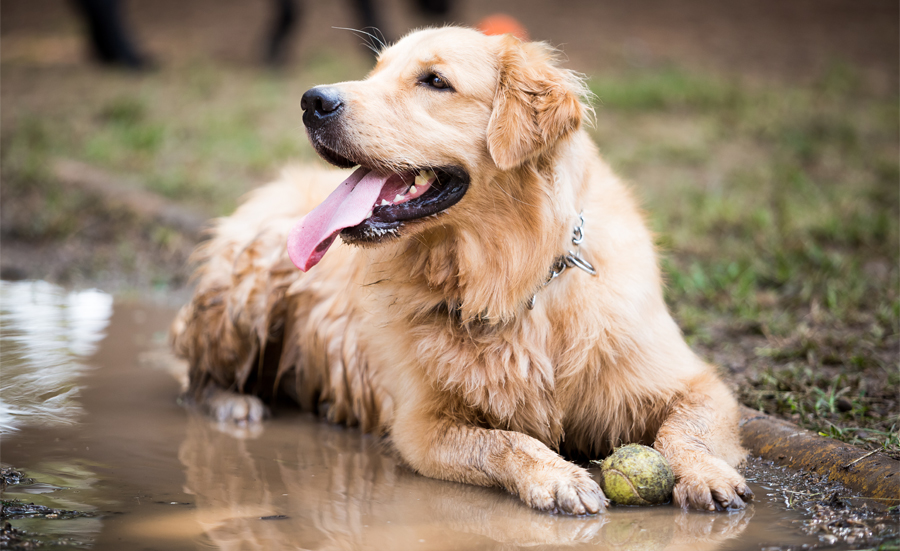Leptospirosis: What You Need to Know

As pet owners, we do everything we can to keep our furry family members safe and healthy. But some illnesses (called zoonoses) don’t just affect our pets—they can also impact people.
One of those diseases is leptospirosis, a bacterial infection that this year has been reported more frequently in Chicago than is typical. Leptospirosis is both preventable and important to understand.
What Is Leptospirosis?
Leptospirosis is caused by Leptospira bacteria, which thrive in warm, wet environments.
- The bacteria live in soil and water contaminated with urine from infected animals (rats, other rodents, dogs, livestock, wildlife).
- The bacteria can survive for weeks to months in moist environments and are more widespread after heavy rains or flooding.
- Humans typically become infected when contaminated water or soil enters the body through cuts or mucous membranes, such as eyes, nose, and mouth. They may also become infected via direct contact with infected animal urine.
- Symptoms in people can be mild—fever, chills, muscle aches, headache, vomiting—but sometimes the condition becomes more serious, affecting kidneys, liver, or lungs. In rare severe cases, it can lead to organ failure. Because of this, it’s considered a public health concern, not just a veterinary one.
Pets (especially dogs) can become infected. A common way dogs become infected is drinking water contaminated with the bacteria. Once infected, dogs can display symptoms like:
- Fever, lethargy, or loss of appetite
- Vomiting and diarrhea
- Icterus/Jaundice (yellowing of the skin or eyes)
- Kidney or liver damage
Treatment is possible, especially when caught early. In severe cases, leptospirosis can be life-threatening.
How Pet Owners Fit In
When pets contract leptospirosis, public health authorities may take note regarding a potential outbreak. Additionally, pets could transmit the bacteria to humans, though this means of transmission is less common than environmental exposure.
Here are several ways pets are involved:
- Dogs can become infected and shed the bacteria through their urine, which could contaminate the home or yard.
- While walking their pets, people may enter into environments, such as parks, mud, or flooded areas, where contaminated water or soil might be present.
- Pets may track contaminated materials into homes.
2025 Leptospirosis Cases in Chicago
Recently, there has been a noticeable uptick in human leptospirosis cases in Chicago. Because of this increased risk, local health authorities have issued alerts and are encouraging the public to be more aware.
Here are some key points regarding the recent cases:
- Six human cases have been reported so far in 2025— more than the usual number. Historically, Chicago sees about two cases per year.
- Four of these 2025 cases had symptom onset between mid-July and late August.
- The cases have been clustered in neighborhoods such as Logan Square and West Town, according to an article in the Chicago Sun-Times.
Protecting Your Pet—and Yourself
The good news is that leptospirosis can often be prevented with practical steps:
- Vaccinate dogs. A safe and effective vaccine is available and is recommended for dogs at risk of exposure. Increasingly across the U.S., this is considered a core vaccine. And while no vaccine is perfect, this is considered a key line of defense. Talk to your veterinarian to see if it’s appropriate for your pet.
- Avoid standing water. Don’t let your dog drink from puddles, ponds, or other stagnant water sources, especially after heavy rains or flooding. Maintain good drainage in your yard.
- Practice good hygiene. Always wash your hands after handling your pet, especially if you’re cleaning up urine, and wash your hands after working in the yard. Cover wounds with waterproof bandages. Wear waterproof gloves and closed-toe footwear when you are gardening or performing yard work.
- Control rodents and wildlife. Report rodent sightings to 311 and secure lids on trash bins. Clean up fallen fruit, keep pet food indoors if possible, and seal entry points where possible to keep rats out of yards.
Why Awareness Matters
Leptospirosis reminds us of how closely our health is tied to that of our pets and the environment we share. By protecting our dogs, we’re also protecting our families and communities.
Leptospirosis infections are still relatively uncommon, but it’s important to know how the disease is transmitted and that there are increased risks after flooding/heavy rains and with rodent exposures.
If your dog shows signs of illness—or if you think you may have been exposed—call us for help or contact your healthcare provider right away.
– Dr. Amanda Hampton
